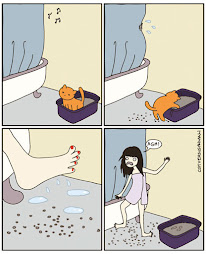Re-post from 2005.
In a recent post about horses, I comment that I prefer books about animals to include humans.
I'm not a huge fan of books which use animals exclusively (no people). The animals do all the same things humans do and wear the same kinds of clothes and have the same kinds of relationships and the only difference seems to be that they live in burrows or whatnot but otherwise, they are really just humans with furry faces.
And I don't get it.
I'll leave Watership Down alone since I've never read it and I saw only 1/4 of the movie when I was a kid; I got so scared, my mom took me outside and let me run around the lobby and eye the candy counter. But I have never understood the appeal of Brian Jacques' books (and please don't hate me, Brian Jacques' fans!) As far as I can tell, it makes precious little difference in Brian Jacques' books whether the heroes are mice, rats, frogs, humans, coyotes or whatever.
Let me elaborate.
In Beatrix Potter, the animal-ness of the animals is intrinsic to the plot. They may be temporarily "dressed up" but they always revert to their animal natures, and their animal natures are at the crux of the stories. Peter Rabbit is acting like a rabbit, sneaking into the farmer's garden to steal cabbages. The squirrels in Squirrel Nutkin act like squirrels. Sure, they talk but their animalness is never forgotten. You couldn't replace Peter Rabbit with George Ape. (Speaking of simians, the same is true of the Curious George books.) C.S. Lewis does this in the Narnia books. There's no point in the animals acting human; there are plenty of humans acting like humans (poorly and nicely) to go around. [And I quite enjoyed Zootopia, especially the "naked" animals, since living arrangements are connected to animal-ness.]
Having written the above, though I don't much care for anthropomophized animals overall, at least with Beatrix Potter and H.A. Rey and Lewis, I get it.
I still prefer my protagonists to be human. Even that old-time classic The Wind in the Willows didn't change my mind. Really, I'm a humanoid-chauvinist.
After all, why write a book about frogs or moles or rats acting like humans when, voila, you could do a book about humans acting like humans!?
Here's what I think may be the answer. The appeal (and C.S. Lewis says as much in his autobiography and in Out of the Silent Planet) is the idea of animals and people being pals, hanging out. It isn't the biology that people like (a la Gerald Durrell); it's the image of animal-ness (or creature-ness) within the human sphere: something you can buddy up to but won't eat you. Similarly, many people like the idea of conversing with animals, as if animals would say more back than "Mine. Mine. Mine." or "Feed me. Feed me. Feed me NOW." The lion or badger or panda is a friend.

Even as a kid, the idea never appealed to me. I wanted a lion cub, yes, but I never thought it would like me. My attitude was reflected in my reading material. As mentioned, I didn't much care for Wind in the Willows. I love the Narnia books but mostly for the people and their quests. I read Animal Farm and yes, it's great, but I couldn't get into the movie. I adore the movie Babe, but I think Babe is an exception. (The animals are very animalish and the whole sheep-herding thing is necessary to the plot--that is, it isn't pigs and sheep and dogs pretending to be humans; it's pigs and sheep and dogs acting very piggy and sheepy and doggy. Beside, James Cromwell is so very, very great.) As mentioned in the previous post, I read and reread Black Stallion and then Frog when I was younger, and I loved them but never picked up another horse book except Black Beauty, which bored me senseless. I quite enjoy the older BBC version of All Creatures Great and Small but honestly, the thing I like best about it is that the vets actually put animals down.
Let me clarify that.
No, I don't like watching animals get killed, but I like people treating animals like animals and not like people in animal clothing.
Which may explain my complete disinterest in the possibility of me and my cats exchanging views on the universe. [I do love the manga series A Man & His Cat, in part because the cats are treated like animals, not little people, but mostly because the story has expanded to include everything and everyone in the main character's universe!]





No comments:
Post a Comment